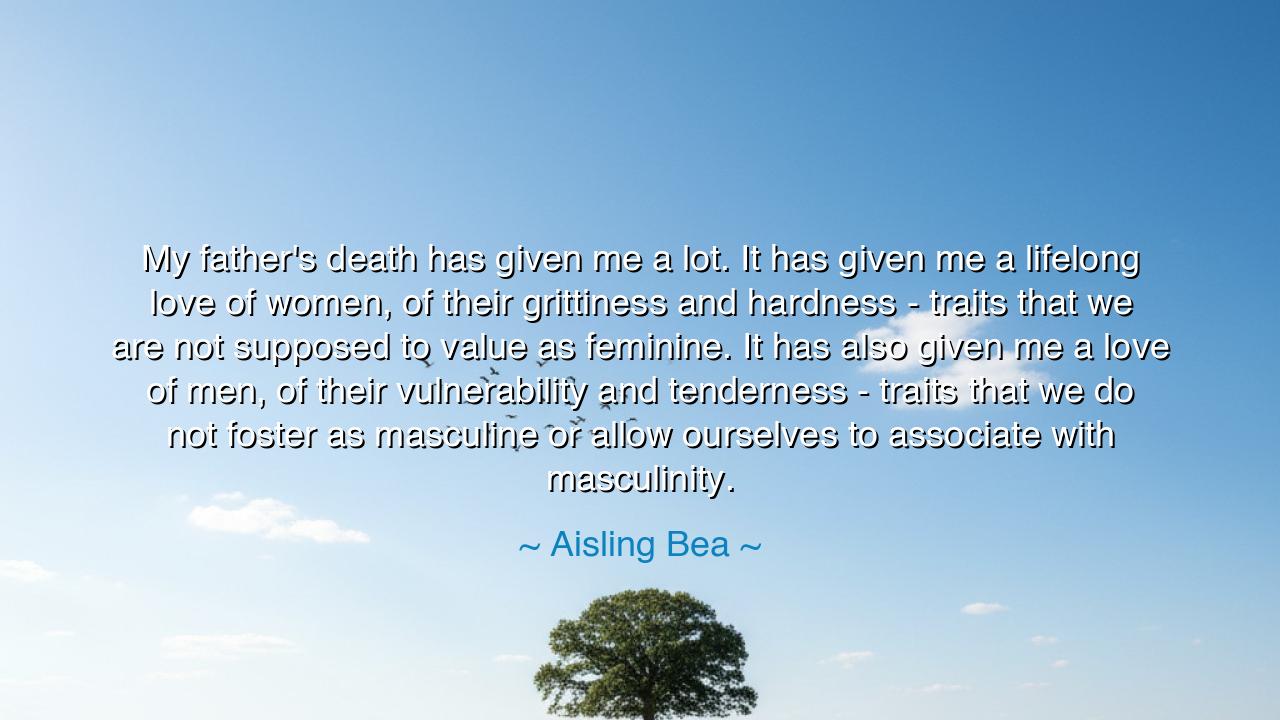
My father's death has given me a lot. It has given me a lifelong
My father's death has given me a lot. It has given me a lifelong love of women, of their grittiness and hardness - traits that we are not supposed to value as feminine. It has also given me a love of men, of their vulnerability and tenderness - traits that we do not foster as masculine or allow ourselves to associate with masculinity.






In the deeply moving words of Aisling Bea, we hear the voice of one who has transmuted pain into wisdom: “My father’s death has given me a lot. It has given me a lifelong love of women, of their grittiness and hardness—traits that we are not supposed to value as feminine. It has also given me a love of men, of their vulnerability and tenderness—traits that we do not foster as masculine or allow ourselves to associate with masculinity.” These words, born of grief yet filled with understanding, speak to the paradox of human suffering—that from loss can come illumination, from heartbreak a greater compassion. Bea’s reflection is not a lament, but a revelation: that tragedy, when faced with courage, can teach us to see beyond the illusions of strength and softness that the world so rigidly divides.
Aisling Bea, an Irish comedian and actress, lost her father when she was a child—a wound that left deep and lasting marks upon her life. For many years, the truth of his death was hidden from her; it was not until later that she learned he had taken his own life. Such knowledge might have crushed the spirit of another, but Bea, through her art and reflection, transformed it into a source of empathy. Her words emerge from that crucible of grief and growth, a recognition that the pain of loss can expand one’s heart rather than harden it. From her father’s death, she learned not only the fragility of life, but the beauty in human complexity—the ways in which strength and tenderness intertwine within both men and women.
Her insight cuts through the false armor of gendered expectation that society has built over centuries. For too long, the world has taught women to be gentle but not gritty, and men to be tough but not tender. Yet Bea, through her suffering, has seen the truth: that feminine strength is not in delicacy alone, but in endurance, courage, and resilience; and that masculine strength is not in stoicism or domination, but in openness, honesty, and the capacity to feel. Her father’s death stripped away the illusions of what men and women “should be,” revealing instead what they truly are—whole beings, made of both steel and sorrow, strength and softness.
There is an ancient echo in her realization. The poets of old knew that the human soul contains both the warrior and the healer, both the mother’s endurance and the father’s gentleness. In the Greek myths, even the gods bore this dual nature: Athena, the goddess of wisdom, was also a warrior; Apollo, the god of light, could be both cruel and compassionate. The ancients understood what modern society often forgets—that balance is the essence of humanity. To deny a man his tears or a woman her strength is to mutilate the spirit. Bea’s words remind us that grief has the power to restore what culture divides—it strips away pretense and reveals the truth of what we all are beneath the roles we play.
Consider, too, how grief itself can be a teacher. History is full of souls who, through the valley of loss, found their deepest understanding of love. When Abraham Lincoln lost his son Willie, he wrote of how death had deepened his sense of compassion for all who suffer. When Frida Kahlo, broken in body and love, painted her pain upon the canvas, she gave the world not despair, but beauty born from endurance. So too does Aisling Bea teach us that even in tragedy, there lies the seed of connection—the ability to love more truly, to see more clearly, to live with greater tenderness toward the frailty of others.
Her insight into the human heart also carries a challenge. For if we are to heal as individuals and as societies, we must learn to honor the full range of our humanity. Men must be taught that vulnerability is not weakness, but courage—the courage to be seen as they are. Women must be reminded that hardness is not cruelty, but survival—the iron that allows compassion to stand firm in a harsh world. And all people must understand that love, real love, lives in the union of opposites: the grit that protects and the gentleness that heals.
So, my children of the present age, take this wisdom to heart: do not flee from your pain, for within it lies your awakening. When grief visits you, let it be your teacher. Learn from it, as Aisling Bea did, the beauty of being both strong and tender, both brave and broken. See the courage in softness, the grace in endurance, the holiness in imperfection. The world will tell you to divide these qualities—to be one or the other, never both. But you, who have suffered and survived, know better. You know that life, like love, demands wholeness.
And when the night grows long and memory stirs with ache, remember this: what wounds you can also awaken you. Let the pain of your past widen your heart, not close it. Love as Bea loves—without boundaries of gender or expectation. For only when we embrace the full truth of our shared humanity can we truly heal the world, and ourselves.






AAdministratorAdministrator
Welcome, honored guests. Please leave a comment, we will respond soon